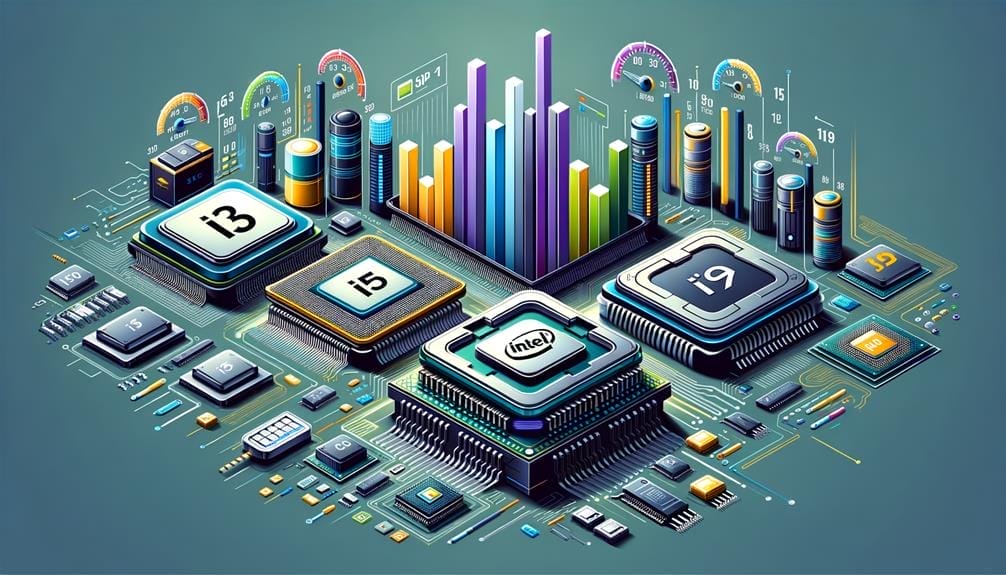Intel Core Showdown: I3, I5, I7, I9 Differences Revealed

At the outset, grasping the distinctions between the various Intel Core processors may seem challenging. Yet, there really is no need to worry. By exploring the details of the i3, i5, i7, and i9 models, you will acquire a deeper comprehension of the unique characteristics of each, aiding you in choosing the perfect processor for your computing requirements.
But before we delve into the specifics, consider this: have you ever wondered how much of a difference the right processor can make to your overall computing experience?
Key Takeaways
- Intel Core CPUs replaced the previous mainstream Pentium CPUs.
- Intel Core CPUs are divided into three tiers: i3, i5, i7, and i9.
- Each generation of Intel Core CPUs shares a microarchitecture.
- Intel Core i9 CPUs offer exceptional multi-threaded performance and are known for their raw performance.
Evolution of Intel Core Processors

As the Intel Core processor line has evolved over the years, it has seen significant advancements in core counts, thread capabilities, and overall performance, establishing itself as a powerhouse in the desktop CPU market.
When comparing Intel Core i3 and i5 processors, the i5 generally outperforms the i3 due to a higher core count, more cache, and higher clock speeds. This leads to better overall performance, especially in multitasking and applications that can utilize multiple cores efficiently.
In benchmark tests, the i5 consistently demonstrates faster processing speeds, making it a more suitable choice for demanding tasks such as gaming, video editing, and content creation.
However, for basic office tasks or light gaming, the i3 may still prove to be a cost-effective solution.
It's important to consider your specific usage scenarios and performance requirements when choosing between the Intel Core i3 and i5 processors.
Unveiling the Intel Core I3 Features
The Intel Core i3 processors feature a blend of entry-level performance and enhanced multitasking capabilities, making them suitable for various office and budget gaming needs.
With historically dual cores, the current Core i3 CPUs now boast four cores and Hyperthreading, significantly improving multitasking capabilities.
Compared to previous Pentium CPUs, the Intel Core i3 processors offer better performance, improved power efficiency, and enhanced multitasking abilities. However, they may lag behind Core i5 and i7 in terms of raw performance and multitasking capabilities.
The pros of Intel Core i3 processors include their affordability, power efficiency, and suitability for light multitasking and gaming.
Conversely, the cons involve limitations in heavy multitasking and demanding applications.
Exploring the Intel Core I5 Advantages

With its optimized balance of P-Cores and E-Cores, the Intel Core i5 CPUs provide a compelling combination of performance and efficiency for a wide range of tasks. These processors are ideal for video editing, enthusiast gaming, and productivity. Compared to the i7, the i5 series offers slightly lower core and thread counts, but at a more accessible price point. The table below showcases the performance benchmarks and gaming capabilities of the Intel Core i5 CPUs in comparison to the i7.
| Feature | Intel Core i5 | Intel Core i7 |
|---|---|---|
| Performance Benchmarks | Impressive performance for most tasks | High performance across all tasks |
| Gaming Capabilities | Excellent gaming capabilities | Superior gaming performance |
| Overclocking Capability | Limited overclocking potential | Extensive overclocking potential |
The i5 series strikes a balance between cost and performance, making it a popular choice for many users.
Delving Into the Intel Core I7 Capabilities
Delving into Intel Core i7 capabilities reveals its high core and thread counts, catering to professionals and competitive gamers seeking exceptional performance. The Intel Core i7 processors boast impressive performance benchmarks, excelling in tasks that demand heavy multitasking, such as video editing and 3D rendering.
With its high clock speeds and advanced Turbo Boost technology, the i7 series delivers substantial processing power, making it suitable for demanding workloads.
In terms of gaming capabilities, the Intel Core i7 CPUs offer excellent performance, especially in games optimized for multi-core processors. When compared to the i5 series, the i7 processors demonstrate superior performance in both single-threaded and multi-threaded tasks, making them an ideal choice for power users and enthusiasts seeking top-tier computing capabilities.
Understanding the Intel Core I9 Superiority

Unquestionably, the Intel Core i9 processors stand out as the pinnacle of Intel's CPU lineup, boasting unparalleled core counts and raw power that cater to the most demanding workloads and high-performance tasks.
- Exceptional Multi-Threaded Performance: Intel Core i9 CPUs excel in handling intensive multi-threaded workloads, delivering superior performance in tasks such as video editing, 3D rendering, and scientific simulations.
- Significant Performance Gains: Intel Core i9 processors showcase substantial improvements in performance benchmarks compared to the i7 counterparts, especially in tasks that heavily rely on parallel processing.
- Enhanced Overclocking Capabilities: The i9 series provides advanced overclocking features, allowing enthusiasts to push the CPUs beyond their base specifications for even greater performance gains.
- Optimized for Demanding Workloads: The i9 CPUs are tailored for professional content creation, gaming at high refresh rates, and running resource-intensive applications with ease.
The benefits of the Intel Core i9 over i7 are clearly reflected in its unparalleled performance metrics and capabilities, making it the go-to choice for users with the most demanding computing needs.
Conclusion
So, now that you've unraveled the mysteries of Intel Core processors, you have a clear understanding of the distinct features and capabilities of the i3, i5, i7, and i9.
Armed with this knowledge, you can confidently choose the perfect processor for your specific needs, whether it's for casual use, content creation, or gaming.
With the evolution of Intel Core processors, the possibilities for maximizing your computing experience are endless.
